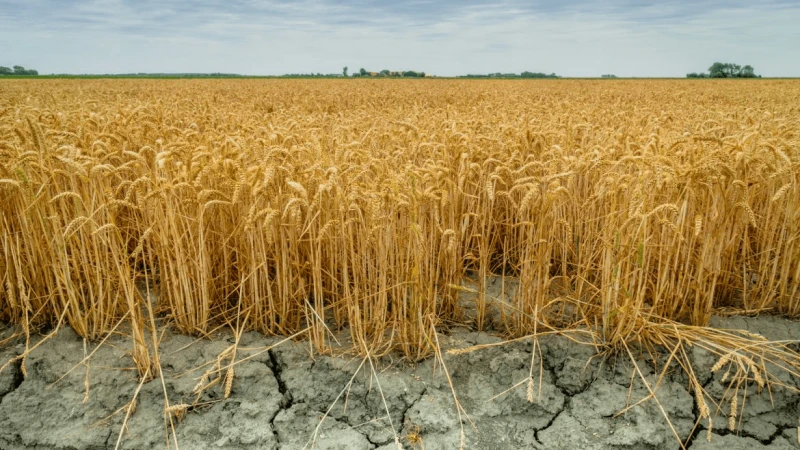Wild wheat: Genetically-tweaked varieties that are not just climate-resilient, but also environmentally regenerative or in the wings
Wild wheat: Genetically-tweaked varieties that are not just climate-resilient, but also environmentally regenerative or in the wings


Modern wheat can thank its “wild relatives” — grassy cousins millions of years old and tested through extremes of earth’s climate — for most of its resistance genes. Today, wheat is the most widely grown crop on Earth, providing 20% of all human protein and calories and serving as the primary staple food for 1.5 billion people in the Global South.
However, with its future under threat, standard breeding approaches can no longer keep up with the pace of climate change. Research shows that climate shifts from 1980-2008 reduced wheat harvests by 5.5%, and global wheat production falls 6% for every degree-centigrade increase in temperature.
Despite such remarkable achievements in wheat breeding, we’ve only scratched the surface of the genetic potential in wheat’s wild relatives. With climate change intensifying and the rapid evolution and spread of pathogens — a new strain of fungus can circulate in the jet stream—it’s imperative that we increase investment in researching this largely untapped genetic diversity. Doing so could revolutionize wheat production, ensuring food security while dramatically reducing agriculture’s environmental footprint.
Wheat science urgently requires enhanced investments to scale up genetic studies of wild relatives, utilizing next-generation breeding tools. These tools include gene sequencing technologies, big-data analytics, and remote sensing technologies. Satellite imagery makes the planet a laboratory, allowing researchers to monitor traits like plant growth or disease resistance globally. Artificial intelligence can super-charge breeding simulations and quickly identify promising genes that enhance climate-resilience.
This is an excerpt. Read the original post here

 | Videos | More... |

Video: Nuclear energy will destroy us? Global warming is an existential threat? Chemicals are massacring bees? Donate to the Green Industrial Complex!
 | Bees & Pollinators | More... |

GLP podcast: Science journalism is a mess. Here’s how to fix it

Mosquito massacre: Can we safely tackle malaria with a CRISPR gene drive?

Are we facing an ‘Insect Apocalypse’ caused by ‘intensive, industrial’ farming and agricultural chemicals? The media say yes; Science says ‘no’
 | Infographics | More... |

Infographic: Global regulatory and health research agencies on whether glyphosate causes cancer
 | GMO FAQs | More... |

Why is there controversy over GMO foods but not GMO drugs?

How are GMOs labeled around the world?

How does genetic engineering differ from conventional breeding?
 | GLP Profiles | More... |

Alex Jones: Right-wing conspiracy theorist stokes fear of GMOs, pesticides to sell ‘health supplements’




 Viewpoint — Fact checking MAHA mythmakers: How wellness influencers and RFK, Jr. undermine American science and health
Viewpoint — Fact checking MAHA mythmakers: How wellness influencers and RFK, Jr. undermine American science and health Viewpoint: Video — Big Solar is gobbling up productive agricultural land and hurting farmers yet providing little energy or sustainabilty gains
Viewpoint: Video — Big Solar is gobbling up productive agricultural land and hurting farmers yet providing little energy or sustainabilty gains Fighting deforestation with CO2: Biotechnology breakthrough creates sustainable palm oil alternative for cosmetics
Fighting deforestation with CO2: Biotechnology breakthrough creates sustainable palm oil alternative for cosmetics Trust issues: What happens when therapists use ChatGPT?
Trust issues: What happens when therapists use ChatGPT? 30-year-old tomato line shows genetic resistance to devastating virus
30-year-old tomato line shows genetic resistance to devastating virus California, Washington, Oregon forge immunization alliance to safeguard vaccine access against federal undermining
California, Washington, Oregon forge immunization alliance to safeguard vaccine access against federal undermining The free-range chicken dilemma: Better for birds, but with substantial costs
The free-range chicken dilemma: Better for birds, but with substantial costs ‘You have to treat the brain first’: Rethinking chronic pain with Sanjay Gupta
‘You have to treat the brain first’: Rethinking chronic pain with Sanjay Gupta
